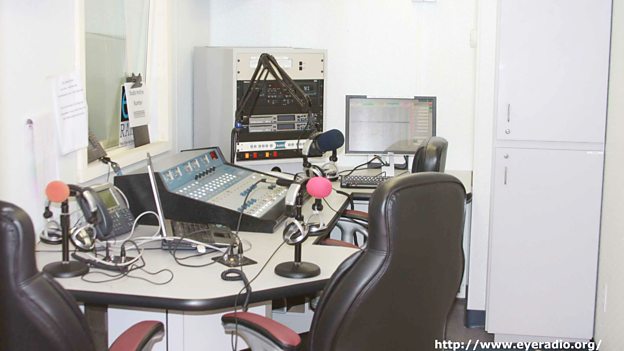You might recall a post from Robert Gulley earlier this week about Eye Radio. Many thanks to SWLing Post contributor, Andrea Borgnino who shares a link to the following article from the BBC about Eye Radio’s broadcasts over shortwave:
(Source: BBC)
A radio station in South Sudan is using older, but tried and tested technology to reach new audiences.
Radio is a crucial medium in South Sudan, where illiteracy is high and many areas lack an electricity supply.
But many people living in remote villages are out of range of existing FM and mediumwave (AM) broadcasts.
Huge distances
To reach these potential listeners, Eye Radio, which is based in the capital Juba and can be heard in regional capitals, has just started broadcasting on shortwave.
The new service covers “the whole of South Sudan, including remote areas in which communities are not able to access FM radio”, says Eye Media head Stephen Omiri.
[…]The station is thought to be renting airtime on a transmitter based outside South Sudan.
Funding for the shortwave service comes from USAID, the international development arm of the US government.
[…]Eye Radio broadcasts in English, standard Arabic, and local languages Dinka, Nuer, Juba Arabic, Bari, Shilluk, Zande and Moro.
The shortwave broadcasts are on the air from 7-8 a.m. local time on 11730 kHz, and 7-8 p.m. on 17730 kHz.
Another station using shortwave to reach South Sudan is Radio Tamazuj, which is based in the Netherlands.
Click here to read the full article at the BBC Monitoring website.


Thomas, you can get Southern Sudan TV on FTA satellite too, Galaxy 19 at 97W Ku. I don’t think they broadcast 24/7, but they are there along with Sudan TV also. Was watching both channels yesterday. Time to get a dish up!
Yes indeed! Actually, I have a dish now–it’s sitting here in the box. Just need the time to mount it. I’ll be testing the Outernet device first, then purchasing a receiver box for FTA action!
This is great additional information from the BBC, highlighting once again the need for shortwave radio. I notice two things in this report which are common to a discussion of shortwave radio: great distances needing coverage which exceed AM or FM broadcasting, and a lack of media freedom from political pressure.
Here’s hoping BBC execs read their own reporter’s stories, and that the Broadcasting Board of Governors sees this as well. Yeah, I know, but I can dream, can’t I?!